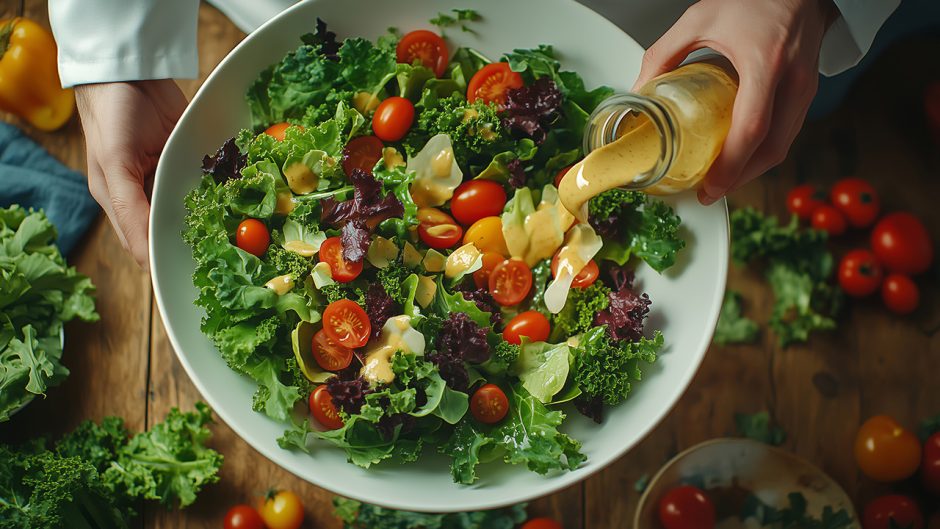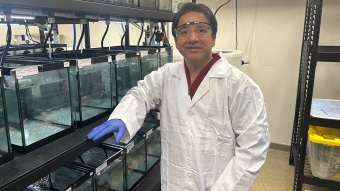
Nov. 17, 2025
Contact: Sara Diedrich, diedrichs@missouri.edu
Think that kale salad you’re eating is a superfood? Without the right ingredient it might not be living up to its hype.
But don’t worry.
Researchers at the University of Missouri have discovered a simple (and delicious) way to help your body absorb more of those coveted nutrients: oil-based dressings or sauces. So, you can have your kale and enjoy it, too.
According to a recent study from Mizzou’s College of Agriculture, Food and Natural Resources (CAFNR), it doesn’t matter whether you cook the kale or eat it raw — the key to unlocking its full nutritional power is pairing it with olive oil, mayonnaise or an oil-based dressing. Now, researchers are exploring how specially designed dressings using nanotechnology could take those benefits even further.

“Kale is a nutrient-rich vegetable that contains carotenoids, including lutein, α-carotene and β-carotene, which have beneficial effects on overall health,” Ruojie (Vanessa) Zhang, assistant professor in the Division of Food, Nutrition and Exercise Sciences at CAFNR, said. “The problem is our bodies have a hard time absorbing these nutrients because they are fat-soluble rather than water-soluble.”
With that in mind, researchers set out to see whether cooking kale or adding specially designed dressings/sauces could make its carotenoids easier for the body to use. These nutrients, along with vitamins C and E and other plant compounds in kale, have been linked to a range of health benefits, including better vision, a stronger immune system and a lower risk of diseases such as diabetes, heart disease and even certain cancers.
Using a lab setup that simulates how food is digested, the research team tested the kale in several ways: raw, cooked, raw or cooked with dressing/sauce, and cooked in sauce.
They found that raw kale alone yields very low carotenoids absorption, and cooking it actually makes absorption slightly worse. The main finding came when they added the special nanoemulsion-based sauce: The simulated digestion model absorbed far more carotenoids, regardless of whether the kale was raw or cooked. In fact, cooking kale with the dressing/sauce worked just as well as mixing it in afterward.
The results are important because they show there are scientific ways to help the human body absorb more of the beneficial nutrients found in fruits and vegetables. The findings also point to new opportunities to make everyday foods healthier by changing how they’re prepared or flavored. Ultimately, Zhang hopes the research will lead to the development of novel dressings and sauces that can further boost the absorption of nutrients from kale and potentially other vegetables.
“Our team is committed to advancing food science with the goal of improving human health through the development of innovative foods and technologies,” she said. “We believe impactful science can drive meaningful change in global nutrition and well-being, and we’re excited to contribute to that mission.”
The study, “Culinary strategies for improving carotenoid bioaccessibility in kale: The role of thermal processing and excipient emulsions,” was published in Food Nutrition.
Co-authors are Dr. Zipei Zhang from Mizzou’s College of Agriculture, Food and Natural Resources; Hangxin Zhu, a doctoral student at Mizzou; and Dr. David Julian McClements from University of Massachusetts, Amherst.



